The Cambridge History of China. Vol. 13: Republican China 1912-1949, Part 2
Подождите немного. Документ загружается.

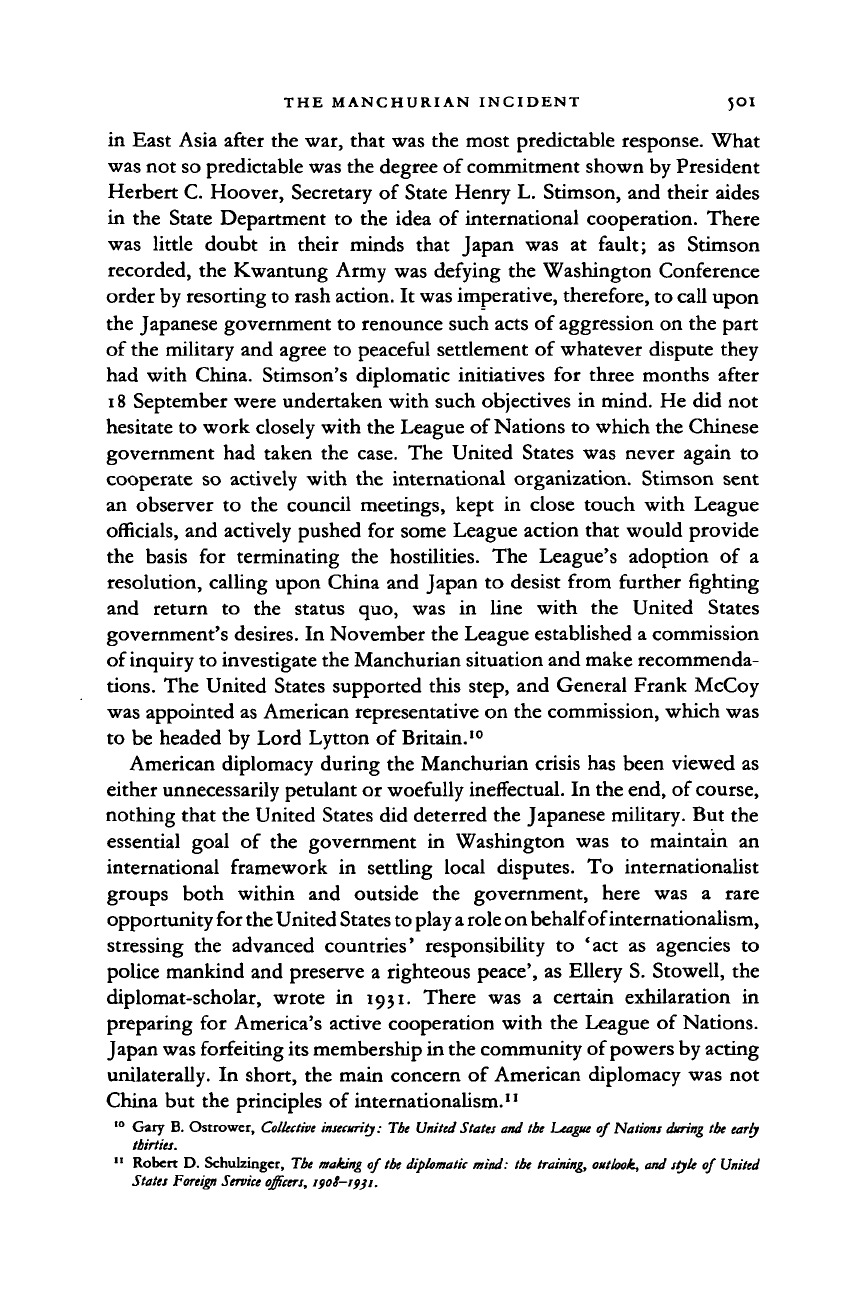
THE MANCHURIAN INCIDENT 501
in East Asia after the war, that was the most predictable response. What
was not so predictable was the degree of commitment shown by President
Herbert C. Hoover, Secretary of State Henry L. Stimson, and their aides
in the State Department to the idea of international cooperation. There
was little doubt in their minds that Japan was at fault; as Stimson
recorded, the Kwantung Army was defying the Washington Conference
order by resorting to rash action. It was imperative, therefore, to call upon
the Japanese government to renounce such acts of aggression on the part
of the military and agree to peaceful settlement of whatever dispute they
had with China. Stimson's diplomatic initiatives for three months after
18 September were undertaken with such objectives in mind. He did not
hesitate to work closely with the League of Nations to which the Chinese
government had taken the case. The United States was never again to
cooperate so actively with the international organization. Stimson sent
an observer to the council meetings, kept in close touch with League
officials, and actively pushed for some League action that would provide
the basis for terminating the hostilities. The League's adoption of a
resolution, calling upon China and Japan to desist from further fighting
and return to the status quo, was in line with the United States
government's desires. In November the League established a commission
of inquiry to investigate the Manchurian situation and make recommenda-
tions.
The United States supported this step, and General Frank McCoy
was appointed as American representative on the commission, which was
to be headed by Lord Lytton of Britain.
10
American diplomacy during the Manchurian crisis has been viewed as
either unnecessarily petulant or woefully ineffectual. In the end, of course,
nothing that the United States did deterred the Japanese military. But the
essential goal of the government in Washington was to maintain an
international framework in settling local disputes. To internationalist
groups both within and outside the government, here was a rare
opportunity for the United States
to
play a role on behalf of internationalism,
stressing the advanced countries' responsibility to 'act as agencies to
police mankind and preserve a righteous peace', as Ellery S. Stowell, the
diplomat-scholar, wrote in 1931. There was a certain exhilaration in
preparing for America's active cooperation with the League of Nations.
Japan was forfeiting its membership in the community of powers by acting
unilaterally. In short, the main concern of American diplomacy was not
China but the principles of internationalism.
11
10
Gary B. Ostrower, Collective insecurity: Tie United States and the League of Nations during the early
thirties.
11
Robert D. Schulzingcr, The making of the diplomatic
mind:
the training, outlook, and style of United
States Foreign Service
officers,
ifo/-ifji.
Cambridge Histories Online © Cambridge University Press, 2008
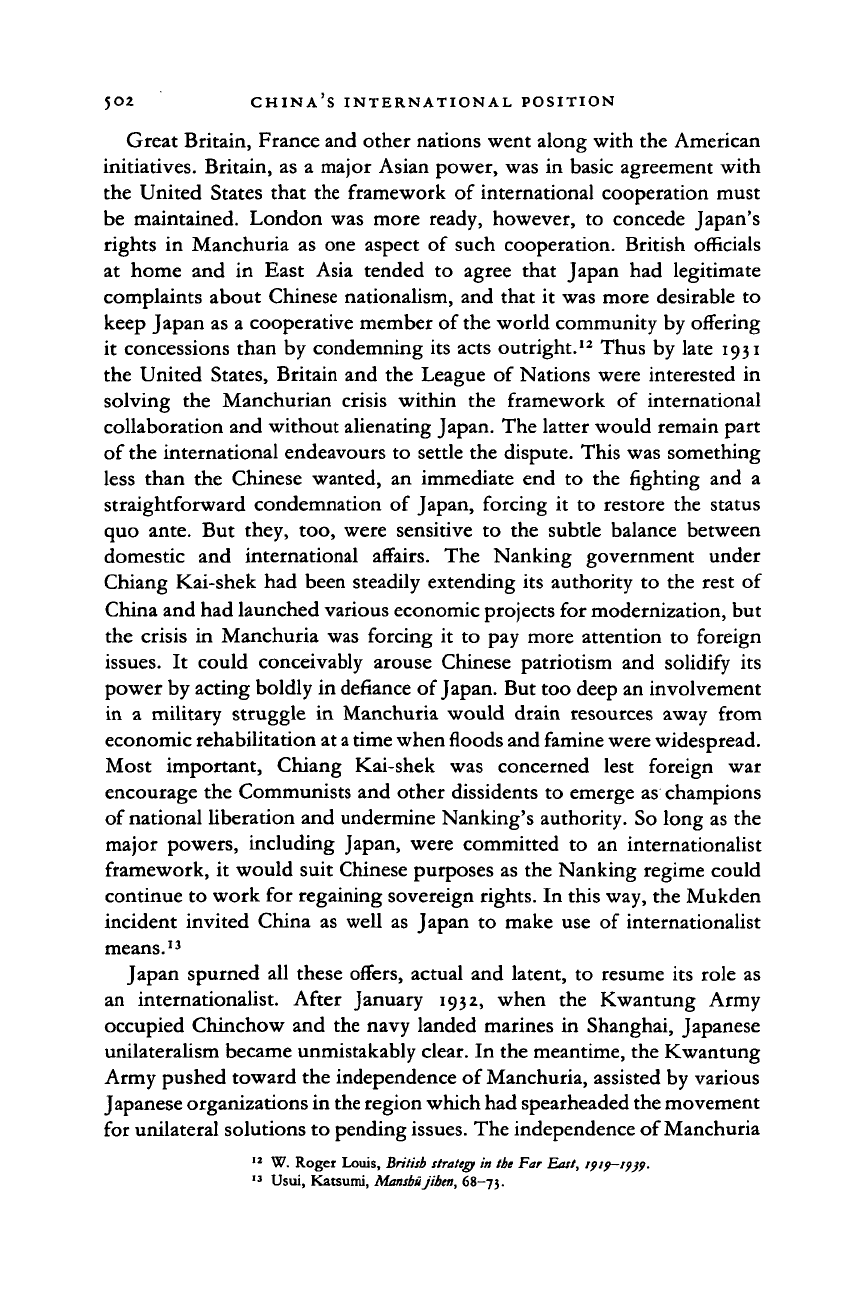
5O2 CHINA S INTERNATIONAL POSITION
Great Britain, France and other nations went along with the American
initiatives. Britain, as a major Asian power, was in basic agreement with
the United States that the framework of international cooperation must
be maintained. London was more ready, however, to concede Japan's
rights in Manchuria as one aspect of such cooperation. British officials
at home and in East Asia tended to agree that Japan had legitimate
complaints about Chinese nationalism, and that it was more desirable to
keep Japan as a cooperative member of the world community by offering
it concessions than by condemning its acts outright.
12
Thus by late 1931
the United States, Britain and the League of Nations were interested in
solving the Manchurian crisis within the framework of international
collaboration and without alienating Japan. The latter would remain part
of the international endeavours to settle the dispute. This was something
less than the Chinese wanted, an immediate end to the fighting and a
straightforward condemnation of Japan, forcing it to restore the status
quo ante. But they, too, were sensitive to the subtle balance between
domestic and international affairs. The Nanking government under
Chiang Kai-shek had been steadily extending its authority to the rest of
China and had launched various economic projects for modernization, but
the crisis in Manchuria was forcing it to pay more attention to foreign
issues. It could conceivably arouse Chinese patriotism and solidify its
power by acting boldly in defiance of
Japan.
But too deep an involvement
in a military struggle in Manchuria would drain resources away from
economic rehabilitation at
a
time when floods and famine were widespread.
Most important, Chiang Kai-shek was concerned lest foreign war
encourage the Communists and other dissidents to emerge as champions
of national liberation and undermine Nanking's authority. So long as the
major powers, including Japan, were committed to an internationalist
framework, it would suit Chinese purposes as the Nanking regime could
continue to work for regaining sovereign rights. In this way, the Mukden
incident invited China as well as Japan to make use of internationalist
means.
13
Japan spurned all these offers, actual and latent, to resume its role as
an internationalist. After January 1932, when the Kwantung Army
occupied Chinchow and the navy landed marines in Shanghai, Japanese
unilateralism became unmistakably clear. In the meantime, the Kwantung
Army pushed toward the independence of Manchuria, assisted by various
Japanese organizations in the region which had spearheaded the movement
for unilateral solutions to pending issues. The independence of Manchuria
12
W. Roger Louis, British strateg in the Far East, 1919-19)9.
13
Usui, Katsumi, Mansbujiben, 68-73.
Cambridge Histories Online © Cambridge University Press, 2008
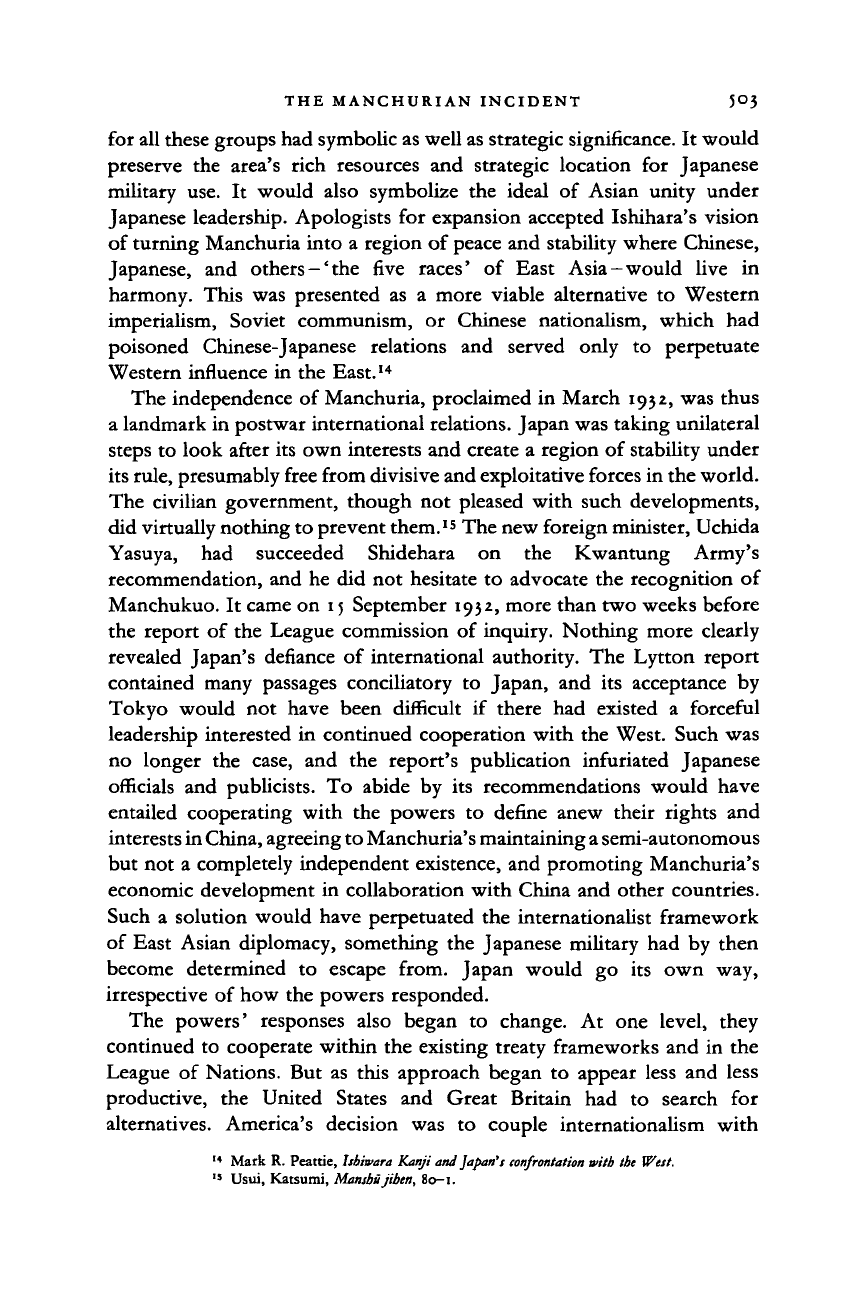
THE MANCHURIAN INCIDENT 5°3
for all these groups had symbolic as well as strategic significance. It would
preserve the area's rich resources and strategic location
for
Japanese
military use.
It
would also symbolize the ideal
of
Asian unity under
Japanese leadership. Apologists for expansion accepted Ishihara's vision
of turning Manchuria into a region of peace and stability where Chinese,
Japanese,
and
others-'the five races'
of
East Asia-would live
in
harmony. This was presented
as a
more viable alternative
to
Western
imperialism, Soviet communism,
or
Chinese nationalism, which
had
poisoned Chinese-Japanese relations
and
served only
to
perpetuate
Western influence in the East.
I4
The independence of Manchuria, proclaimed in March 1952, was thus
a landmark in postwar international relations. Japan was taking unilateral
steps to look after its own interests and create a region of stability under
its rule, presumably free from divisive and exploitative forces in the world.
The civilian government, though not pleased with such developments,
did virtually nothing to prevent them.
15
The new foreign minister, Uchida
Yasuya,
had
succeeded Shidehara
on the
Kwantung Army's
recommendation, and he did not hesitate to advocate the recognition of
Manchukuo. It came on 15 September 1932, more than two weeks before
the report
of
the League commission of inquiry. Nothing more clearly
revealed Japan's defiance
of
international authority. The Lytton report
contained many passages conciliatory
to
Japan, and
its
acceptance
by
Tokyo would
not
have been difficult
if
there
had
existed
a
forceful
leadership interested in continued cooperation with the West. Such was
no longer
the
case,
and the
report's publication infuriated Japanese
officials and publicists.
To
abide
by its
recommendations would have
entailed cooperating with the powers
to
define anew their rights and
interests
in
China,
agreeing to Manchuria's maintaining
a
semi-autonomous
but not a completely independent existence, and promoting Manchuria's
economic development in collaboration with China and other countries.
Such
a
solution would have perpetuated the internationalist framework
of East Asian diplomacy, something the Japanese military had by then
become determined
to
escape from. Japan would
go its
own way,
irrespective of how the powers responded.
The powers' responses also began
to
change.
At
one level, they
continued to cooperate within the existing treaty frameworks and in the
League
of
Nations. But as this approach began
to
appear less and less
productive,
the
United States
and
Great Britain
had to
search
for
alternatives. America's decision was
to
couple internationalism with
14
Mark R. Peattie,
Ubiwara Kanji
and japan's
confrontation with
tie West.
15
Usui, Katsumi, Mambujibcti, 80-1.
Cambridge Histories Online © Cambridge University Press, 2008
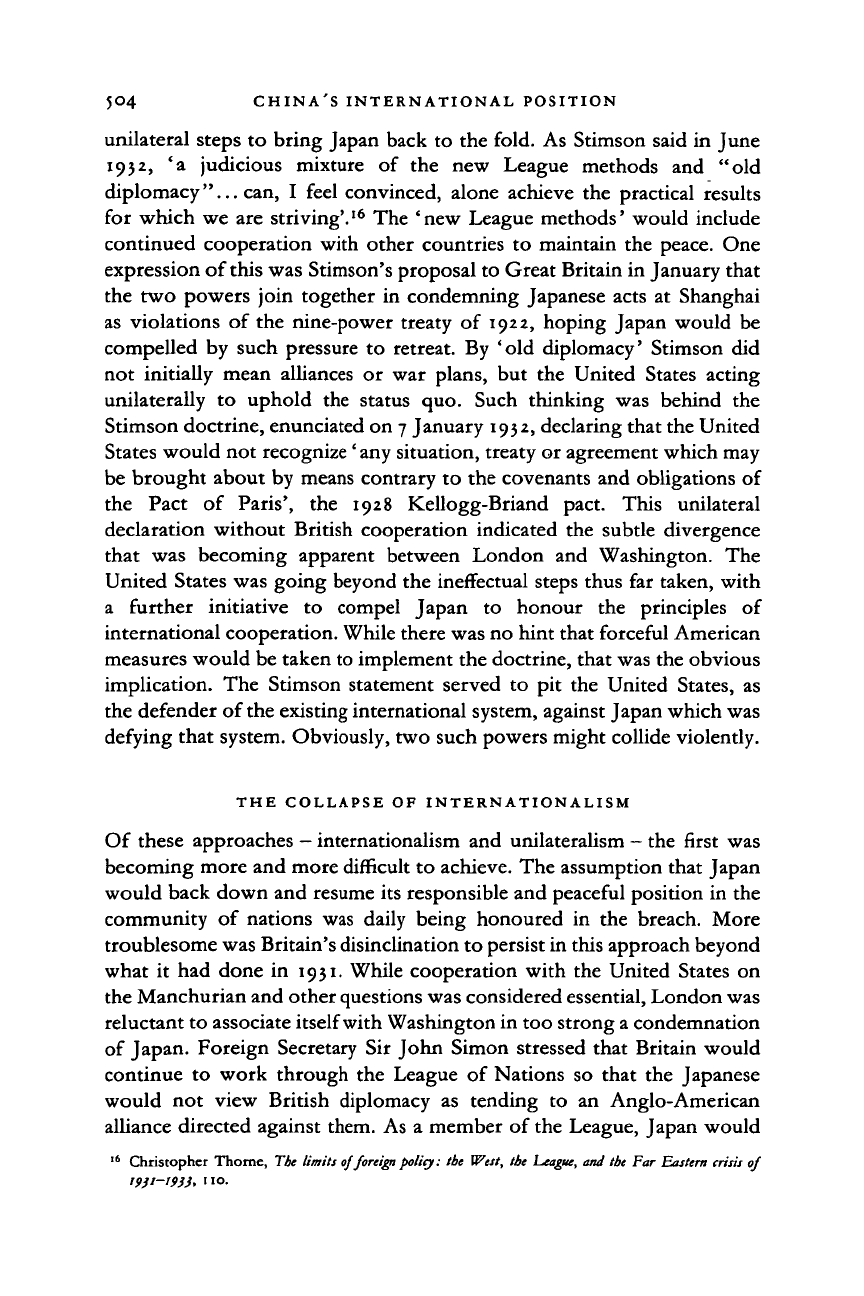
504 CHINA'S INTERNATIONAL POSITION
unilateral steps to bring Japan back to the fold. As Stimson said in June
1932,
'a judicious mixture of the new League methods and "old
diplomacy"... can, I feel convinced, alone achieve the practical results
for which we are striving'.
16
The 'new League methods' would include
continued cooperation with other countries to maintain the peace. One
expression of this was Stimson's proposal to Great Britain in January that
the two powers join together in condemning Japanese acts at Shanghai
as violations of the nine-power treaty of 1922, hoping Japan would be
compelled by such pressure to retreat. By 'old diplomacy' Stimson did
not initially mean alliances or war plans, but the United States acting
unilaterally to uphold the status quo. Such thinking was behind the
Stimson doctrine, enunciated on
7
January 1932, declaring that the United
States would not recognize' any situation, treaty or agreement which may
be brought about by means contrary to the covenants and obligations of
the Pact of Paris', the 1928 Kellogg-Briand pact. This unilateral
declaration without British cooperation indicated the subtle divergence
that was becoming apparent between London and Washington. The
United States was going beyond the ineffectual steps thus far taken, with
a further initiative to compel Japan to honour the principles of
international cooperation. While there was no hint that forceful American
measures would be taken to implement the doctrine, that was the obvious
implication. The Stimson statement served to pit the United States, as
the defender of the existing international system, against Japan which was
defying that system. Obviously, two such powers might collide violently.
THE COLLAPSE OF INTERNATIONALISM
Of these approaches - internationalism and unilateralism - the first was
becoming more and more difficult to achieve. The assumption that Japan
would back down and resume its responsible and peaceful position in the
community of nations was daily being honoured in the breach. More
troublesome was Britain's disinclination to persist in this approach beyond
what it had done in 1931. While cooperation with the United States on
the Manchurian and other questions was considered essential, London was
reluctant to associate itself with Washington in too strong a condemnation
of Japan. Foreign Secretary Sir John Simon stressed that Britain would
continue to work through the League of Nations so that the Japanese
would not view British diplomacy as tending to an Anglo-American
alliance directed against them. As a member of the League, Japan would
16
Christopher Thome, The limits of foreign policy: the West, the Ltague, and tie Far Eastern crisis of
'9)1-19}), no-
Cambridge Histories Online © Cambridge University Press, 2008
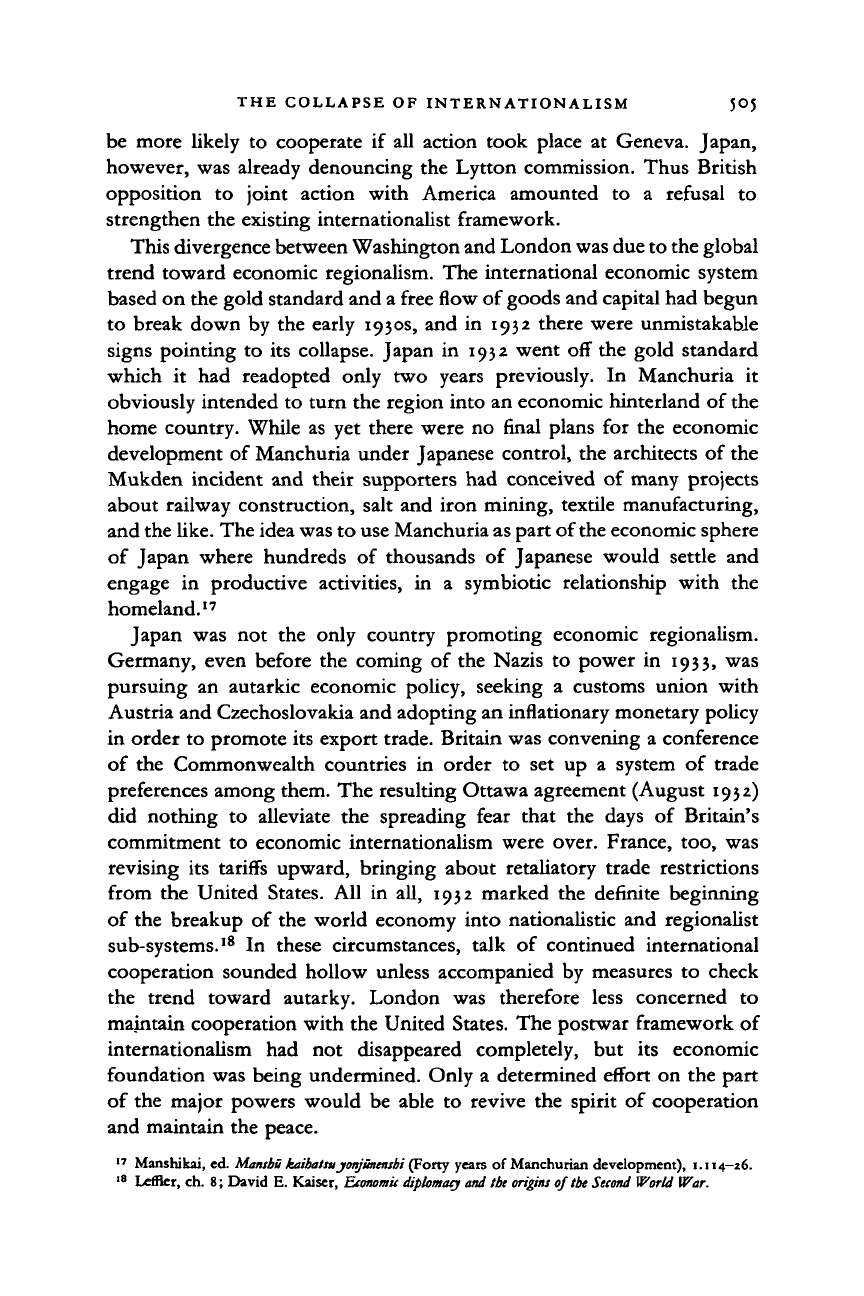
THE COLLAPSE OF INTERNATIONALISM JOJ
be more likely to cooperate if all action took place at Geneva. Japan,
however, was already denouncing the Lytton commission. Thus British
opposition to joint action with America amounted to a refusal to
strengthen the existing internationalist framework.
This divergence between Washington and London
was
due to the global
trend toward economic regionalism. The international economic system
based on the gold standard and a free flow of goods and capital had begun
to break down by the early 1930s, and in 1932 there were unmistakable
signs pointing to its collapse. Japan in 1932 went off the gold standard
which it had readopted only two years previously. In Manchuria it
obviously intended to turn the region into an economic hinterland of the
home country. While as yet there were no final plans for the economic
development of Manchuria under Japanese control, the architects of the
Mukden incident and their supporters had conceived of many projects
about railway construction, salt and iron mining, textile manufacturing,
and the like. The idea was to use Manchuria as part of the economic sphere
of Japan where hundreds of thousands of Japanese would settle and
engage in productive activities, in a symbiotic relationship with the
homeland.
17
Japan was not the only country promoting economic regionalism.
Germany, even before the coming of the Nazis to power in 1933, was
pursuing an autarkic economic policy, seeking a customs union with
Austria and Czechoslovakia and adopting an inflationary monetary policy
in order to promote its export trade. Britain was convening a conference
of the Commonwealth countries in order to set up a system of trade
preferences among them. The resulting Ottawa agreement (August 1932)
did nothing to alleviate the spreading fear that the days of Britain's
commitment to economic internationalism were over. France, too, was
revising its tariffs upward, bringing about retaliatory trade restrictions
from the United States. All in all, 1932 marked the definite beginning
of the breakup of the world economy into nationalistic and regionalist
sub-systems.
18
In these circumstances, talk of continued international
cooperation sounded hollow unless accompanied by measures to check
the trend toward autarky. London was therefore less concerned to
maintain cooperation with the United States. The postwar framework of
internationalism had not disappeared completely, but its economic
foundation was being undermined. Only a determined effort on the part
of the major powers would be able to revive the spirit of cooperation
and maintain the peace.
17
Manshikai,
ed.
Mansbiikaibatsujonjinensbi (Forty years
of
Manchurian development),
I.I
14—26.
18
Leffler, ch.
8;
David
E.
Kaiser,
Economic
diplomacy and the origins
of
the
Second
World
War.
Cambridge Histories Online © Cambridge University Press, 2008
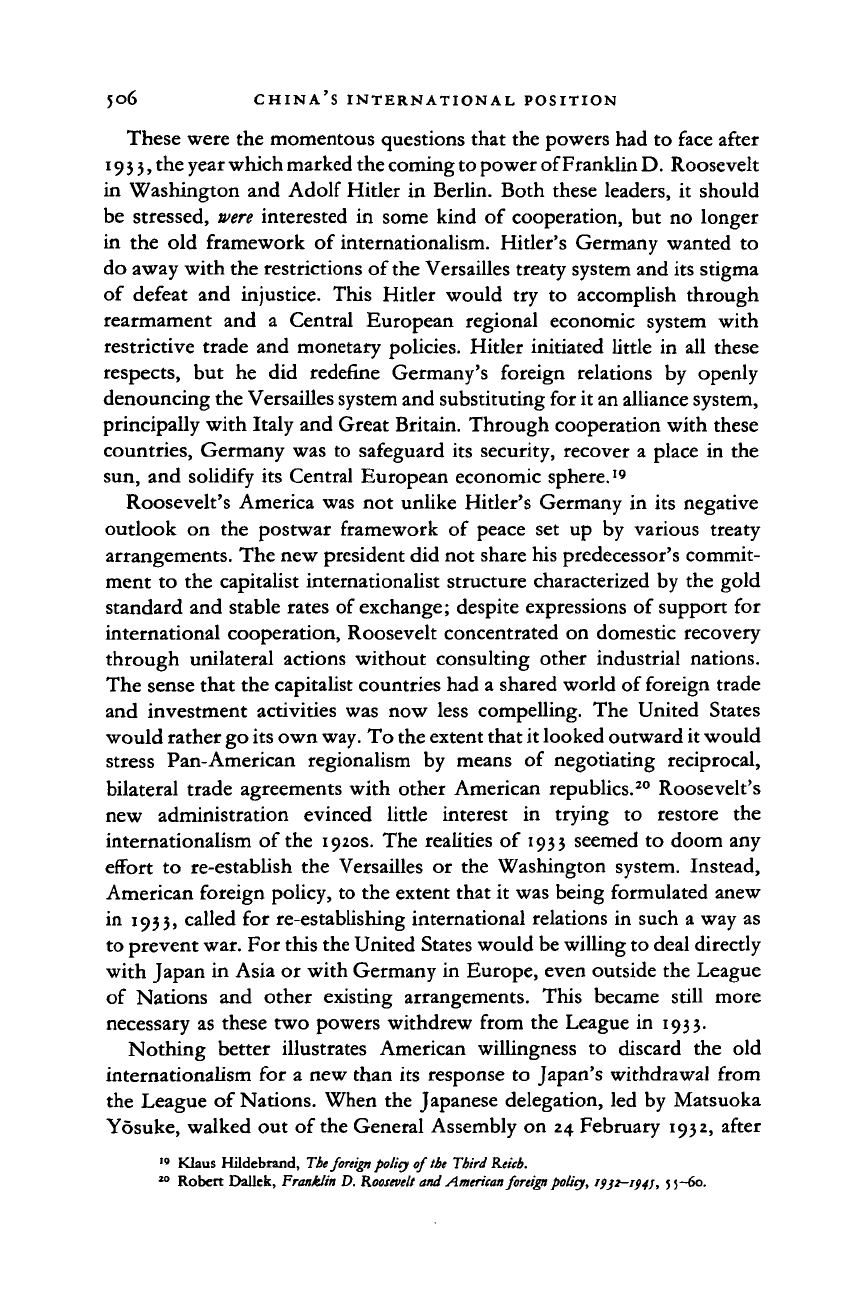
506 CHINA'S INTERNATIONAL POSITION
These were the momentous questions that the powers had to face after
1933,
the year which marked the coming to power of Franklin
D.
Roosevelt
in Washington and Adolf Hitler in Berlin. Both these leaders, it should
be stressed,
were
interested in some kind of cooperation, but no longer
in the old framework of internationalism. Hitler's Germany wanted to
do away with the restrictions of the Versailles treaty system and its stigma
of defeat and injustice. This Hitler would try to accomplish through
rearmament and a Central European regional economic system with
restrictive trade and monetary policies. Hitler initiated little in all these
respects, but he did redefine Germany's foreign relations by openly
denouncing the Versailles system and substituting for it an alliance system,
principally with Italy and Great Britain. Through cooperation with these
countries, Germany was to safeguard its security, recover a place in the
sun, and solidify its Central European economic sphere.
19
Roosevelt's America was not unlike Hitler's Germany in its negative
outlook on the postwar framework of peace set up by various treaty
arrangements. The new president did not share his predecessor's commit-
ment to the capitalist internationalist structure characterized by the gold
standard and stable rates of exchange; despite expressions of support for
international cooperation, Roosevelt concentrated on domestic recovery
through unilateral actions without consulting other industrial nations.
The sense that the capitalist countries had a shared world of foreign trade
and investment activities was now less compelling. The United States
would rather go its own
way.
To the extent that it looked outward it would
stress Pan-American regionalism by means of negotiating reciprocal,
bilateral trade agreements with other American republics.
20
Roosevelt's
new administration evinced little interest in trying to restore the
internationalism of the 1920s. The realities of 1933 seemed to doom any
effort to re-establish the Versailles or the Washington system. Instead,
American foreign policy, to the extent that it was being formulated anew
in 1933, called for re-establishing international relations in such a way as
to prevent war. For this the United States would be willing to deal directly
with Japan in Asia or with Germany in Europe, even outside the League
of Nations and other existing arrangements. This became still more
necessary as these two powers withdrew from the League in 1933.
Nothing better illustrates American willingness to discard the old
internationalism for a new than its response to Japan's withdrawal from
the League of Nations. When the Japanese delegation, led by Matsuoka
Yosuke, walked out of the General Assembly on 24 February 1932, after
" Klaus Hildebrand, The foreign policy of
the
Third Reich.
20
Robert Dallck, Franklin D. Roosevelt and American foreign policy, ifj2-rf^j, 55-60.
Cambridge Histories Online © Cambridge University Press, 2008
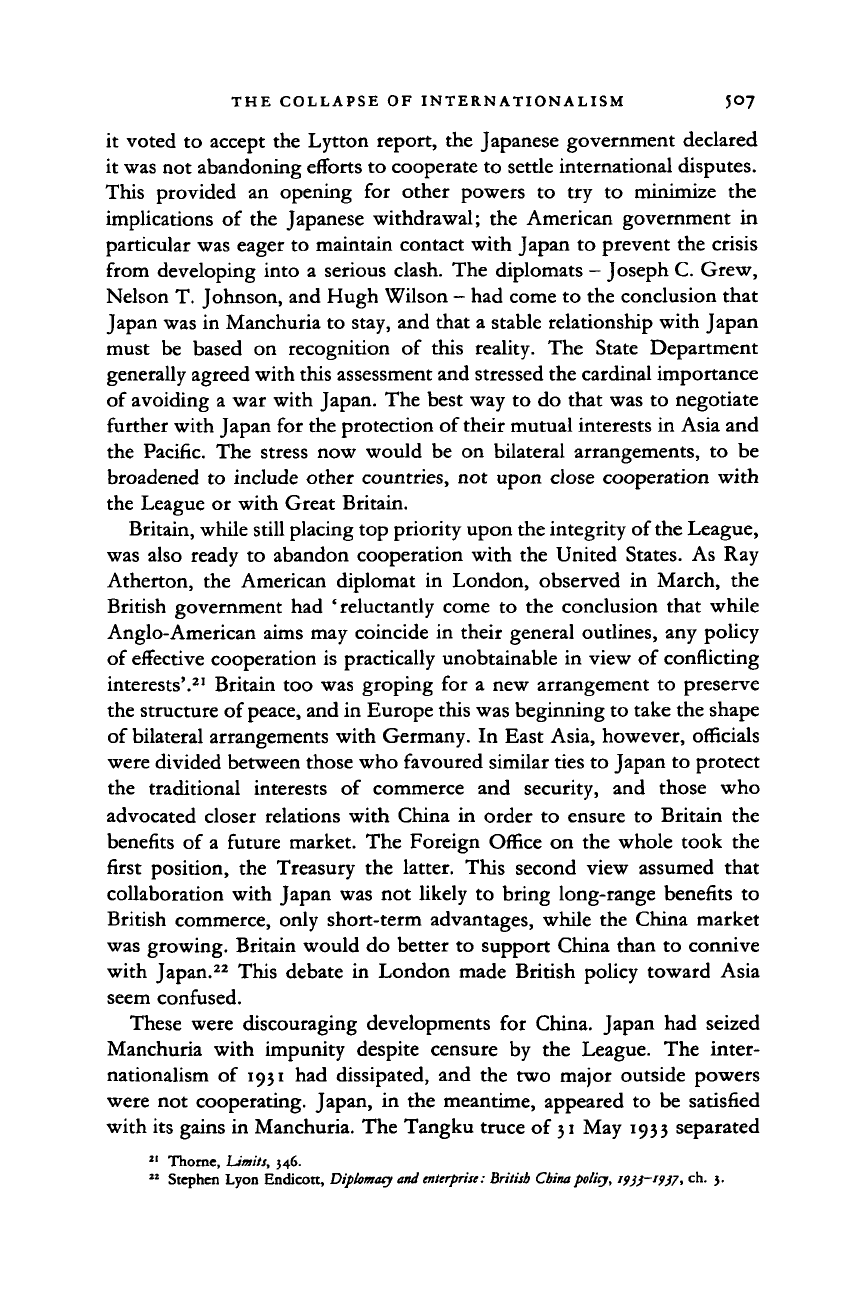
THE COLLAPSE OF INTERNATIONALISM 507
it voted to accept the Lytton report, the Japanese government declared
it was not abandoning efforts to cooperate to settle international disputes.
This provided an opening for other powers to try to minimize the
implications of the Japanese withdrawal; the American government in
particular was eager to maintain contact with Japan to prevent the crisis
from developing into a serious clash. The diplomats - Joseph C. Grew,
Nelson T. Johnson, and Hugh Wilson - had come to the conclusion that
Japan was in Manchuria to stay, and that a stable relationship with Japan
must be based on recognition of this reality. The State Department
generally agreed with this assessment and stressed the cardinal importance
of avoiding a war with Japan. The best way to do that was to negotiate
further with Japan for the protection of their mutual interests in Asia and
the Pacific. The stress now would be on bilateral arrangements, to be
broadened to include other countries, not upon close cooperation with
the League or with Great Britain.
Britain, while still placing top priority upon the integrity of the League,
was also ready to abandon cooperation with the United States. As Ray
Atherton, the American diplomat in London, observed in March, the
British government had 'reluctantly come to the conclusion that while
Anglo-American aims may coincide in their general outlines, any policy
of effective cooperation is practically unobtainable in view of conflicting
interests'.
21
Britain too was groping for a new arrangement to preserve
the structure of
peace,
and in Europe this was beginning to take the shape
of bilateral arrangements with Germany. In East Asia, however, officials
were divided between those who favoured similar ties to Japan to protect
the traditional interests of commerce and security, and those who
advocated closer relations with China in order to ensure to Britain the
benefits of a future market. The Foreign Office on the whole took the
first position, the Treasury the latter. This second view assumed that
collaboration with Japan was not likely to bring long-range benefits to
British commerce, only short-term advantages, while the China market
was growing. Britain would do better to support China than to connive
with Japan.
22
This debate in London made British policy toward Asia
seem confused.
These were discouraging developments for China. Japan had seized
Manchuria with impunity despite censure by the League. The inter-
nationalism of 1931 had dissipated, and the two major outside powers
were not cooperating. Japan, in the meantime, appeared to be satisfied
with its gains in Manchuria. The Tangku truce of
31
May 1933 separated
21
Thome, Limits, 346.
11
Stephen Lyon Endicott, Diplomacy and enterprise: British China policy, ifJJ-i9)7, ch. 3.
Cambridge Histories Online © Cambridge University Press, 2008
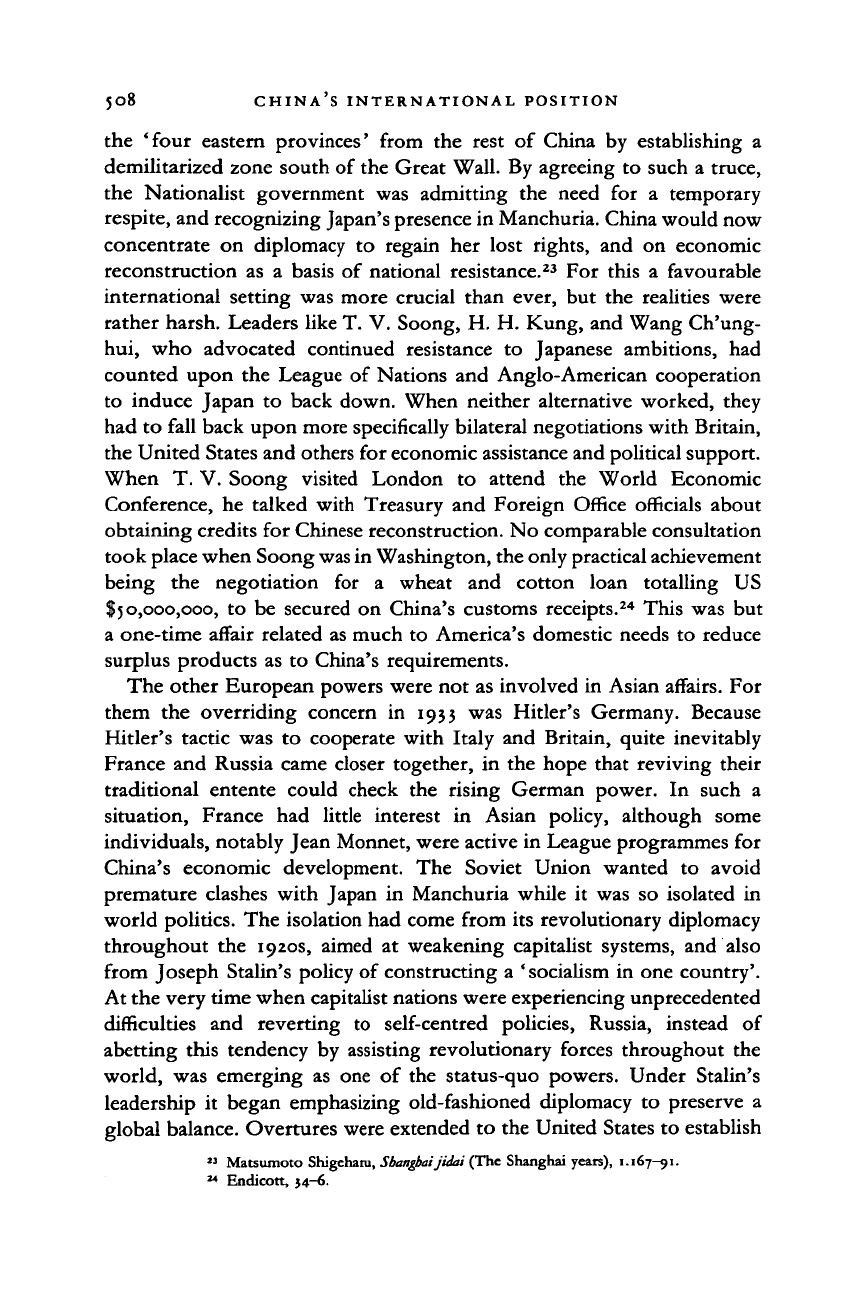
508 CHINA'S INTERNATIONAL POSITION
the 'four eastern provinces' from
the
rest
of
China
by
establishing
a
demilitarized zone south
of the
Great Wall.
By
agreeing
to
such
a
truce,
the Nationalist government
was
admitting
the
need
for a
temporary
respite,
and
recognizing Japan's presence
in
Manchuria. China would
now
concentrate
on
diplomacy
to
regain
her
lost rights,
and on
economic
reconstruction
as a
basis
of
national resistance.
23
For
this
a
favourable
international setting
was
more crucial than ever,
but the
realities were
rather harsh. Leaders like
T. V.
Soong,
H. H.
Kung,
and
Wang Ch'ung-
hui,
who
advocated continued resistance
to
Japanese ambitions,
had
counted upon
the
League
of
Nations
and
Anglo-American cooperation
to induce Japan
to
back down. When neither alternative worked, they
had
to
fall back upon more specifically bilateral negotiations with Britain,
the United States
and
others
for
economic assistance
and
political support.
When
T. V.
Soong visited London
to
attend
the
World Economic
Conference,
he
talked with Treasury
and
Foreign Office officials about
obtaining credits
for
Chinese reconstruction.
No
comparable consultation
took place when Soong
was
in Washington, the only practical achievement
being
the
negotiation
for a
wheat
and
cotton loan totalling
US
$50,000,000,
to be
secured
on
China's customs receipts.
24
This
was but
a one-time affair related
as
much
to
America's domestic needs
to
reduce
surplus products
as to
China's requirements.
The other European powers were
not as
involved
in
Asian affairs.
For
them
the
overriding concern
in 1933 was
Hitler's Germany. Because
Hitler's tactic
was to
cooperate with Italy
and
Britain, quite inevitably
France
and
Russia came closer together,
in the
hope that reviving their
traditional entente could check
the
rising German power.
In
such
a
situation, France
had
little interest
in
Asian policy, although some
individuals, notably Jean Monnet, were active
in
League programmes
for
China's economic development.
The
Soviet Union wanted
to
avoid
premature clashes with Japan
in
Manchuria while
it was so
isolated
in
world politics.
The
isolation
had
come from
its
revolutionary diplomacy
throughout
the
1920s, aimed
at
weakening capitalist systems,
and
also
from Joseph Stalin's policy
of
constructing
a
'socialism
in one
country'.
At the very time when capitalist nations were experiencing unprecedented
difficulties
and
reverting
to
self-centred policies, Russia, instead
of
abetting this tendency
by
assisting revolutionary forces throughout
the
world,
was
emerging
as one of the
status-quo powers. Under Stalin's
leadership
it
began emphasizing old-fashioned diplomacy
to
preserve
a
global balance. Overtures were extended
to the
United States
to
establish
13
Matsumoto Shigchatu,
Shanghaijidai
(The Shanghai
years),
1.167-91.
u
Endicott,
34-6.
Cambridge Histories Online © Cambridge University Press, 2008
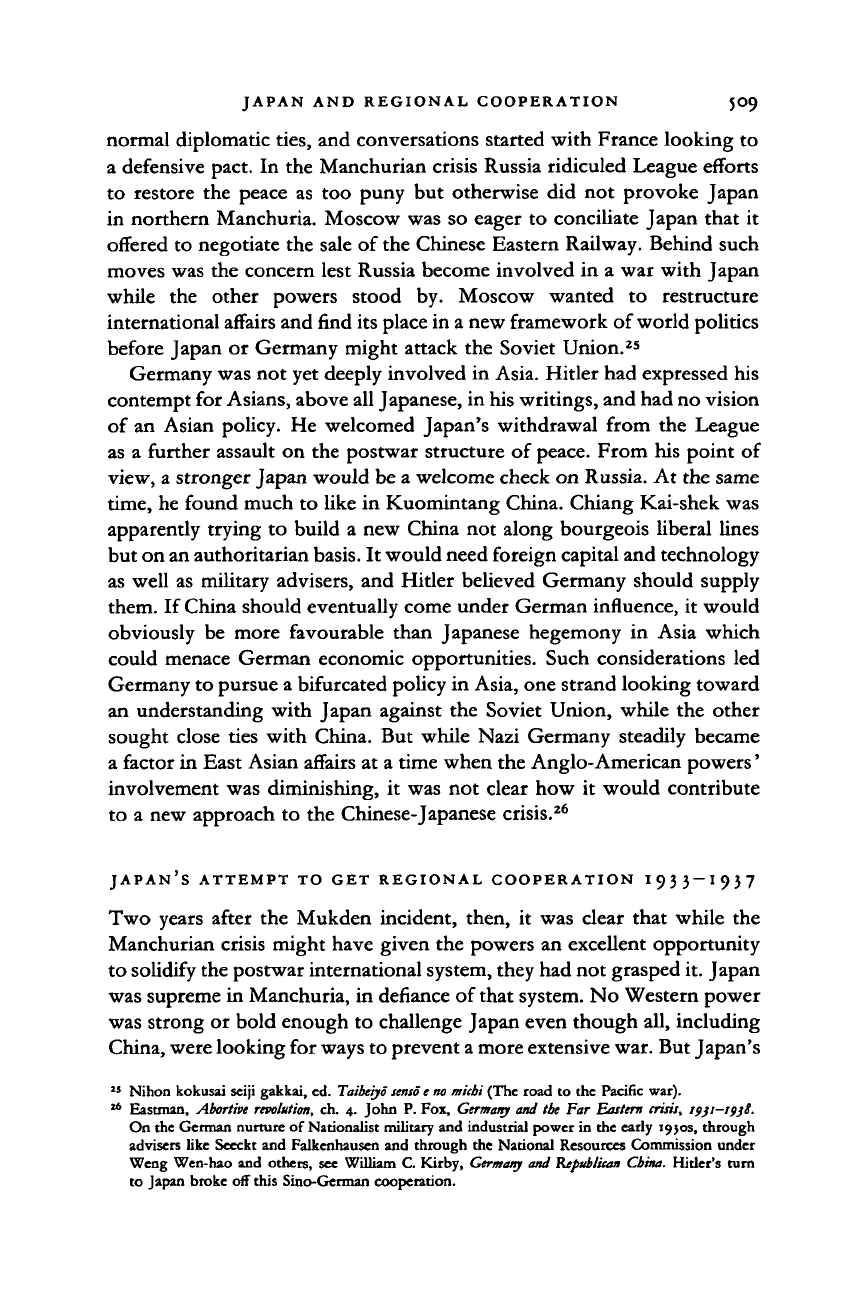
JAPAN AND REGIONAL COOPERATION 509
normal diplomatic ties,
and
conversations started with France looking
to
a defensive pact.
In the
Manchurian crisis Russia ridiculed League efforts
to restore
the
peace
as too
puny
but
otherwise
did not
provoke Japan
in northern Manchuria. Moscow
was so
eager
to
conciliate Japan that
it
offered
to
negotiate
the
sale
of
the Chinese Eastern Railway. Behind such
moves
was the
concern lest Russia become involved
in a war
with Japan
while
the
other powers stood
by.
Moscow wanted
to
restructure
international affairs
and
find
its
place
in
a new framework of world politics
before Japan
or
Germany might attack
the
Soviet Union.
25
Germany was
not yet
deeply involved
in
Asia. Hitler
had
expressed
his
contempt
for
Asians, above all Japanese,
in
his writings,
and
had
no
vision
of
an
Asian policy.
He
welcomed Japan's withdrawal from
the
League
as
a
further assault
on the
postwar structure
of
peace. From
his
point
of
view,
a
stronger Japan would
be a
welcome check
on
Russia.
At the
same
time,
he
found much
to
like
in
Kuomintang China. Chiang Kai-shek
was
apparently trying
to
build
a new
China
not
along bourgeois liberal lines
but
on
an authoritarian
basis.
It
would need foreign capital and technology
as well
as
military advisers,
and
Hitler believed Germany should supply
them.
If
China should eventually come under German influence,
it
would
obviously
be
more favourable than Japanese hegemony
in
Asia which
could menace German economic opportunities. Such considerations
led
Germany
to
pursue a bifurcated policy
in
Asia, one strand looking toward
an understanding with Japan against
the
Soviet Union, while
the
other
sought close ties with China.
But
while Nazi Germany steadily became
a factor
in
East Asian affairs
at a
time when
the
Anglo-American powers'
involvement
was
diminishing,
it was not
clear
how it
would contribute
to
a new
approach
to the
Chinese-Japanese crisis.
26
JAPAN'S ATTEMPT TO GET REGIONAL COOPERATION
1933-1937
Two years after
the
Mukden incident, then,
it was
clear that while
the
Manchurian crisis might have given
the
powers
an
excellent opportunity
to solidify the postwar international system, they had
not
grasped it. Japan
was supreme
in
Manchuria,
in
defiance
of
that system.
No
Western power
was strong
or
bold enough
to
challenge Japan even though all, including
China, were looking
for
ways to prevent a more extensive war. But Japan's
25
Nihon kokusai seiji gakkai, ed. Taibeiyo senso
e
no micbi (The road
to
the Pacific war).
26
Eastman, Abortive revolution, ch.
4.
John P. Fox, Germany and the
Far
Eastern crisis, if)i-if}S.
On the German nurture
of
Nationalist military and industrial power in the early 1930s, through
advisers like Seeckt and Falkenhausen and through the National Resources Commission under
Weng Wen-hao and others, see William C. Kirby, Germany and Republican China. Hitler's turn
to Japan broke off this Sino-German cooperation.
Cambridge Histories Online © Cambridge University Press, 2008
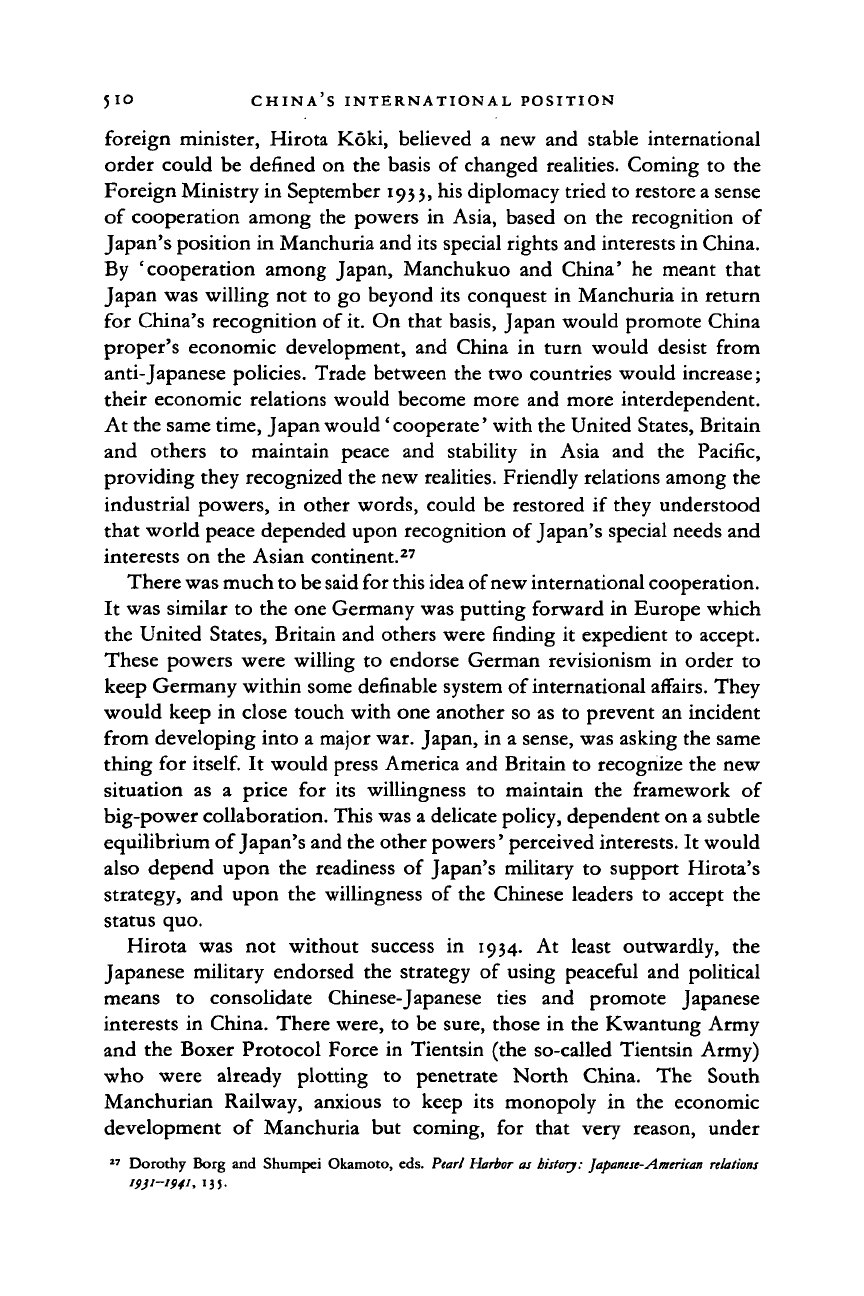
JIO CHINA S INTERNATIONAL POSITION
foreign minister, Hirota Koki, believed a new and stable international
order could be denned on the basis of changed realities. Coming to the
Foreign Ministry in September
193},
his diplomacy tried to restore a sense
of cooperation among the powers in Asia, based on the recognition of
Japan's position in Manchuria and its special rights and interests in China.
By 'cooperation among Japan, Manchukuo and China' he meant that
Japan was willing not to go beyond its conquest in Manchuria in return
for China's recognition of it. On that basis, Japan would promote China
proper's economic development, and China in turn would desist from
anti-Japanese policies. Trade between the two countries would increase;
their economic relations would become more and more interdependent.
At the same time, Japan would' cooperate' with the United States, Britain
and others to maintain peace and stability in Asia and the Pacific,
providing they recognized the new realities. Friendly relations among the
industrial powers, in other words, could be restored if they understood
that world peace depended upon recognition of Japan's special needs and
interests on the Asian continent.
27
There was much to be said for this idea of new international cooperation.
It was similar to the one Germany was putting forward in Europe which
the United States, Britain and others were finding it expedient to accept.
These powers were willing to endorse German revisionism in order to
keep Germany within some definable system of international affairs. They
would keep in close touch with one another so as to prevent an incident
from developing into a major war. Japan, in a sense, was asking the same
thing for
itself.
It would press America and Britain to recognize the new
situation as a price for its willingness to maintain the framework of
big-power collaboration. This was a delicate policy, dependent on a subtle
equilibrium of Japan's and the other powers' perceived interests. It would
also depend upon the readiness of Japan's military to support Hirota's
strategy, and upon the willingness of the Chinese leaders to accept the
status quo.
Hirota was not without success in 1934. At least outwardly, the
Japanese military endorsed the strategy of using peaceful and political
means to consolidate Chinese-Japanese ties and promote Japanese
interests in China. There were, to be sure, those in the Kwantung Army
and the Boxer Protocol Force in Tientsin (the so-called Tientsin Army)
who were already plotting to penetrate North China. The South
Manchurian Railway, anxious to keep its monopoly in the economic
development of Manchuria but coming, for that very reason, under
" Dorothy Borg and Shumpei Okamoto, eds. Pearl Harbor as history: Japanese-American relations
19)1-1941, 135.
Cambridge Histories Online © Cambridge University Press, 2008
